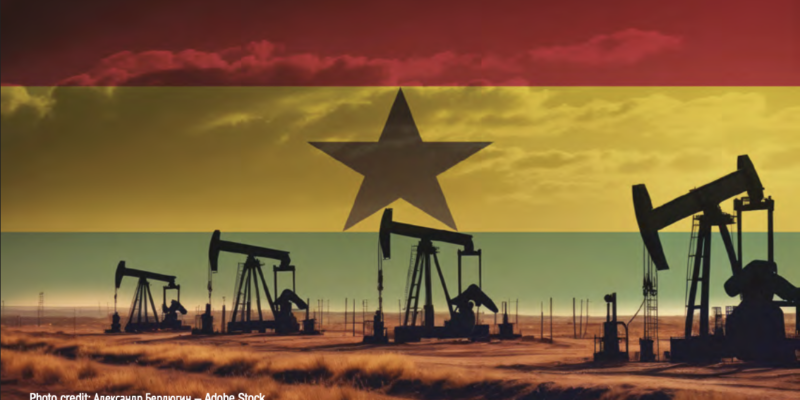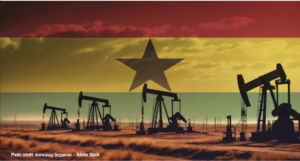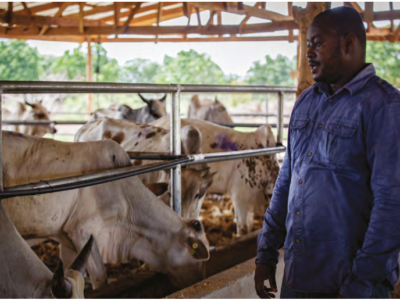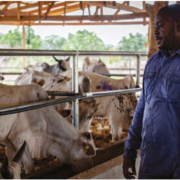Ghana ‘s emergence as an oil and gas producer has unlocked significant potential in the sector, driven by substantial growth since the discovery of commercial
oil reserves in the Jubilee fields in 2007. The country boasts three major offshore oil and gas fields, namely Jubilee, Tweneboa Enyera Ntomme (TEN), and Sankofa-Gye Nyame. In 2021, these fields collectively produced 55.06 million barrels of oil.
The industry comprises 16 upstream operators and has seen notable discov- eries, with 25 new findings in 2021. Currently, the country has 17 oil blocks, indicating ongoing exploration and de- velopment activities in its offshore areas. Additionally, Ghana’s oil and gas land- scape includes 179 oil wells and a grow- ing number of gas-producing assets.
However, Ghana’s midstream industry is still in the developing stage. The coun- try’s primary oil refinery, Tema Oil Re- finery (TOR), possesses an operational capacity of 45,000 barrels per day (bpd). Unfortunately, operational challenges have hindered TOR’s efficiency, lead- ing to a reduced capacity averaging at 24,000 bpd.
Due to the limited refining capacity within the West African region, Ghana heavily relies on refined fuel imports from other countries. Major sources of refined fuel imports include Italy, the Netherlands, and the United Arab Emirates (UAE). This reliance under- scores the importance of further investment and development in Ghana’s midstream infrastructure to enhance domestic refining capacity and reduce dependency on imported petroleum products.
Ghana’s refinery capacity stood at 24,000 barrels per day in 2021, indicating op- portunities for further downstream de- velopment and investment in refining infrastructure to support the country’s growing oil and gas sector. There are 37 bulk distribution companies, 170 oil marketing companies, and 42 liquefied petroleum gas marketing companies, facilitating the movement of petroleum products across the country.
In terms of revenue generation, the industry contributes substantially to Ghana’s economy, with total petroleum receipts amounting to GHS 12 billion in 2022 from both oil and gas production. The Ministry of Energy, which oversees the sector, projects that total output will reach 173,000 bpd by year end 2024.
In Ghana, the upstream sector, govern- ing the exploration and production of petroleum resources, falls under the regulatory purview of the Petroleum (Exploration and Production) Act, 2016 (Act 919). This legislation, replacing the Provisional National Defence Council Law (PNDCL) 84, aims to ensure that upstream petroleum activities are conducted safely and efficiently, while also maximising Ghana’s benefits from the exploitation of its petroleum resources.
On the other hand, oversight of the downstream industry, which en- compasses refining, distribution, and marketing of petroleum products, is managed by the National Petroleum Authority (NPA). Established by the NPA Act 2005, Act 691, this regulatory body plays a crucial role in ensuring the efficient and profitable operation of the downstream sector, while also safe- guarding consumer interests by ensur- ing fair industry practices and value for money.
Ghana offers an enticing pro-business environment, underpinned by invest- ment guarantees and incentives, mak- ing it an attractive destination for inves- tors. The sector is subject to rigorous regulation, with the implementation of essential regulations and the estab- lishment of regulatory bodies such as the Petroleum Revenue Management Regulations (2019) and the Petroleum (Exploration and Production) (Gen- eral Regulations) 2018 (LI 2359). These regulations are designed to safeguard investments, ensure operations are conducted in a safe environment, and guarantee the delivery of high-quality outputs to customers.
The approval of the Petroleum Hub Development Corporation project by the government presents promising opportunities for growth. This initia- tive aims to establish three refineries, five multipurpose petrochemical plants, tank farms, jetties, and enhanced port infrastructure, which could significantly boost the oil and gas sector. Moreover, there is considerable potential in the vast expanse of prospective and underex- plored acreage, which holds the promise of hosting substantial oil fields, further enhancing the industry’s prospects for expansion and development.
As the population size and urbanisation in Ghana continue to rise, the demand for domestic fuels and gas is experienc- ing rapid growth. This trend creates a lu- crative market for energy providers and investors looking to capitalise on the increasing consumption of energy re- sources. Additionally, there is a growing need for alternative gas flaring solutions within the oil and gas industry. Investing in innovative technologies and practices to minimise or eliminate gas flaring presents an opportunity for companies to improve their environmental sustain- ability and operational efficiency while meeting regulatory requirements.
SECTOR OPPORTUNITIES
• Provision of independent power plants.
• Investment in the Petroleum Devel- opment Hub Corporation.
• Provision of refinery, storage, mar- keting, and transportation of petroleum and gas products.
• Deployment of 4D seismic technol- ogy.
• Investment in natural gas infra- structure.
• Provision of drilling products and services.
• Joint ventures facilitating enhanced local content participation in Ghana’s oil and gas sector through partnerships between international and indigenous companies.
• Robust regulatory framework, coupled with favourable government policies, creates an enabling environ- ment for increased participation and investment in the sector.
• Government offers both economic and regulatory incentives to investors such as Double Taxation Agreements (DTAs); guarantee against expropria- tion; corporate tax exemptions and waivers on import duties and levies on machinery and equipment; losses car- ried forward for three years minimum; Bilateral Investment Treaties (BITs); and Multilateral Investment Guarantee Agency (MIGA) membership.
• Ghana has one of the most com- petitive fiscal regimes in the subregion with 4 and 12.5 percent of gross oil pro- duction and a corporate income tax of 35 percent.
• Jubilee oil is light, sweet and has the high quality that is attractive to global refineries and can compete with the international price reference oils.
Ghana benefitted from high export commodities prices for most of
2022, but prices declined at the end of the year and remained weak in
the first half of 2023. The prices of crude oil, gold, and cocoa remained
elevated in 2022, helping lift the trade balance. However, commodity
prices have declined sharply over the past six months. The World Bank
commodity price index declined by 32 percent from its historic peak in
June 2022, the sharpest drop since the Covid-19 pandemic started. As a result, the price surges that followed the Russian Federation’s invasion of Ukraine have largely been unwound due to a combi- nation of slowing global economic activity, favourable winter weather, and the redirection of trade of key commodity exports from Russia and Ukraine. The Brent Crude oil price is 35 percent below its recent record high in June 2022, despite experiencing volatility in March 2023, and is projected to average $80/bbl in 2023, a $8/bbl downward revision from the January forecast, and to edge up to $82/bbl in 2024, reflecting a modest pickup in demand.
Source: 7th Ghana Economic Update. Price Surge: Unravelling Inflation’s Toll on
Poverty and Food Security. Produced by the World Bank Group. https://documents1.worldbank.org/curated/en/099072023055014341/pdf/P177994046644e0e- 20b3dd057c81347c0ef.pdf
















Comments